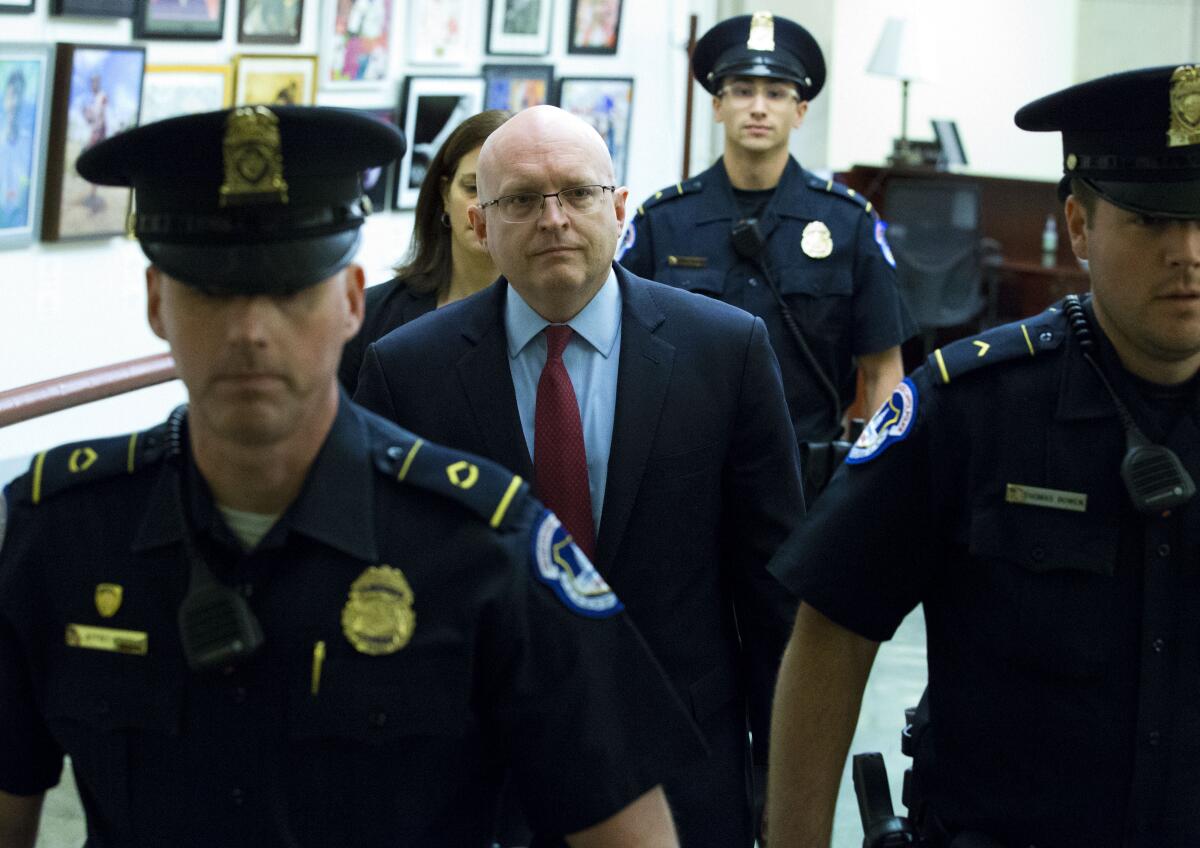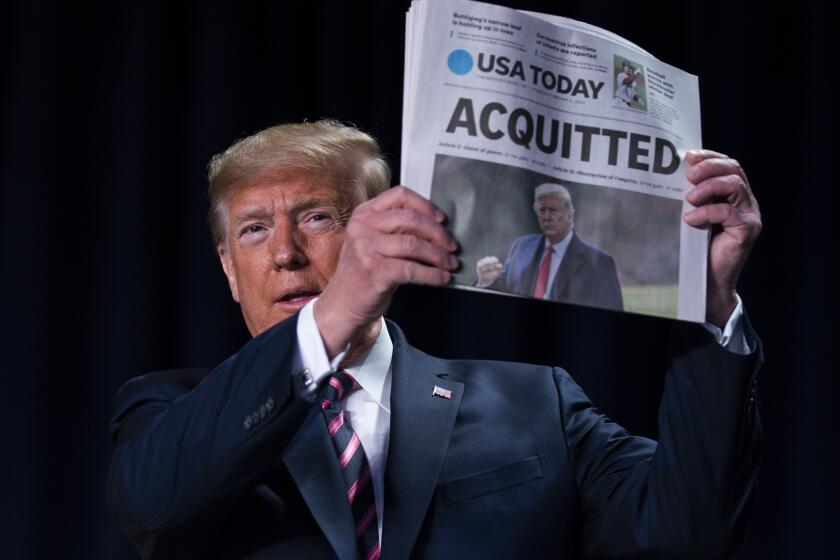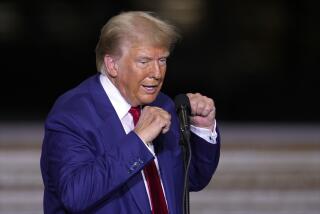Ex-Trump aide wants judge to decide on impeachment testimony

WASHINGTON — An ex-White House advisor who’s supposed to testify before House impeachment investigators on Monday has asked a federal court whether he should comply with a subpoena or follow President Trump’s directive against cooperating with what the president dubs a “scam.”
After getting a subpoena Friday, former deputy national security advisor Charles Kupperman quickly filed a lawsuit in U.S. district court in Washington. He asked a judge to decide whether he should accede to House demands for his testimony or to assert “immunity from congressional process” as directed by Trump.
The lawsuit came as the Democrats’ impeachment inquiry continued at full speed with a rare Saturday session. Philip T. Reeker, the acting assistant secretary of State for Europe, took questions behind closed doors for more than eight hours about Trump’s ouster of the ambassador of Ukraine in May and whether he had knowledge about efforts to persuade Ukraine to pursue politically motivated investigations.
Kupperman, who provided foreign policy advice to the president, was scheduled to testify in a similar session Monday. In the lawsuit, Kupperman said he “cannot satisfy the competing demands of both the legislative and executive branches.” Without the court’s help, he said, he would have to make the decision himself — one that could “inflict grave constitutional injury” on either Congress or the presidency.
The impeachment inquiry is rooted in a July 25 phone call Trump made to Ukrainian President Volodymyr Zelensky. During the call, Trump asked the Ukrainian leader to pursue investigations of Democratic political rival Joe Biden’s family and Ukraine’s role in the 2016 election that propelled Trump into the White House.
The House of Representatives intends to vote to impeach President Trump for abusing his office and obstructing Congress, a condemnation that only two other U.S. presidents have faced in the nation’s 243-year history. Despite the historic nature of the vote on charging the president with committing high crimes and misdemeanors, Trump’s fate has been sealed for days, if not weeks in the Democratic-controlled House.
At the time of the call, Trump was withholding congressionally approved military aid for Ukraine. He has repeatedly said there was no quid pro quo for the Ukraine investigations he was seeking, though witness testimony has contradicted that claim.
Kupperman’s filing says “an erroneous judgment to abide by the President’s assertion of testimonial immunity would unlawfully impede the House from carrying out one of its most important core Constitutional responsibilities” — the power of impeachment — and subject Kupperman to “potential criminal liability for contempt of Congress.”
On the other hand, “an erroneous judgment to appear and testify in obedience to the House Defendants’ subpoena would unlawfully impair the President in the exercise of his core national security responsibilities ... by revealing confidential communications” from advisors, according to the filing.
He has asked the court to expedite a decision, but unless the judge issues an opinion by Monday, Kupperman’s testimony might not occur as scheduled.
Rejecting his arguments, the three chairmen of the House committees overseeing the inquiry told Kupperman’s lawyers in a letter that the suit was without merit and appeared to be coordinated with the White House. They called the suit “an obvious and desperate tactic by the President to delay and obstruct the lawful constitutional functions of Congress and conceal evidence about his conduct from the impeachment inquiry.”
The chairmen also said Kupperman’s defiance of the subpoena would constitute evidence in a contempt proceeding as well as additional evidence of Trump’s obstruction of the inquiry. They said they planned to proceed with the Monday session as scheduled.
The lawsuit came as Democrats investigating the president won a victory in a separate case. A federal judge ordered the Justice Department on Friday to give the House secret grand jury testimony from special counsel Robert S. Mueller III’s Russia investigation and affirmed the legality of the Democrats’ impeachment inquiry. That decision could inform Kupperman’s suit.
On Saturday, Trump tweeted that he’s “not concerned with the impeachment scam. I am not because I did nothing wrong.”
In the House deposition, Reeker was expected to corroborate testimony from previous witnesses who have described the Trump administration’s dealings with Ukraine, according to a person familiar with Reeker’s role in Ukraine policy. The person was not authorized to publicly discuss the testimony and spoke on condition of anonymity.
Lawmakers leaving the meeting with Reeker said he was backing up testimony from previous witnesses, most all of whom have detailed concerns with Trump’s efforts to oust U.S. Ambassador to Ukraine Marie Yovanovitch and said they were wary of Rudolph W. Giuliani, Trump’s personal lawyer who was driving the push for the Ukrainian probes.
Two people familiar with the testimony said that Reeker told the lawmakers he was disturbed by the effort to oust Yovanovitch. One of the people said that he also told investigators that State Department officials had decided not to put out a statement in support of her. The people requested anonymity to discuss the confidential meeting.
Washington Rep. Denny Heck, a member of the House intelligence panel, would not give details about the closed-door interview but said, “It’s almost startling how much all of the witnesses have been in alignment.”
As was the case with other witnesses, the Trump administration directed Reeker not to testify, according to two people familiar with the situation who spoke on condition of anonymity because they were not authorized to publicly discuss the interaction. But Reeker appeared anyway after receiving his subpoena from the House, the people said.
Although he is the top U.S. diplomat for Europe and has been since Yovanovich was recalled, Reeker was not directly involved in debate over aid to Ukraine, which other current and former officials have said was delegated to Gordon Sondland, the U.S. ambassador to the European Union, and Kurt Volker, former U.S. envoy to Ukraine.
Volker testified and released text messages that detailed conversations between him, Sondland and William B. Taylor Jr., the top U.S. diplomat in Ukraine. In the messages, Taylor wrote that he thought it was “crazy” to withhold aid from Ukraine for help with a political campaign. Sondland and Taylor, who still work for the government, have already testified and detailed their concerns about Giuliani’s influence on Ukraine. Giuliani was leading the push for the investigations.
Taylor testified that he was told the aid would be withheld until Ukraine conducted the investigations that Trump had requested.
More to Read
Get the L.A. Times Politics newsletter
Deeply reported insights into legislation, politics and policy from Sacramento, Washington and beyond. In your inbox three times per week.
You may occasionally receive promotional content from the Los Angeles Times.











